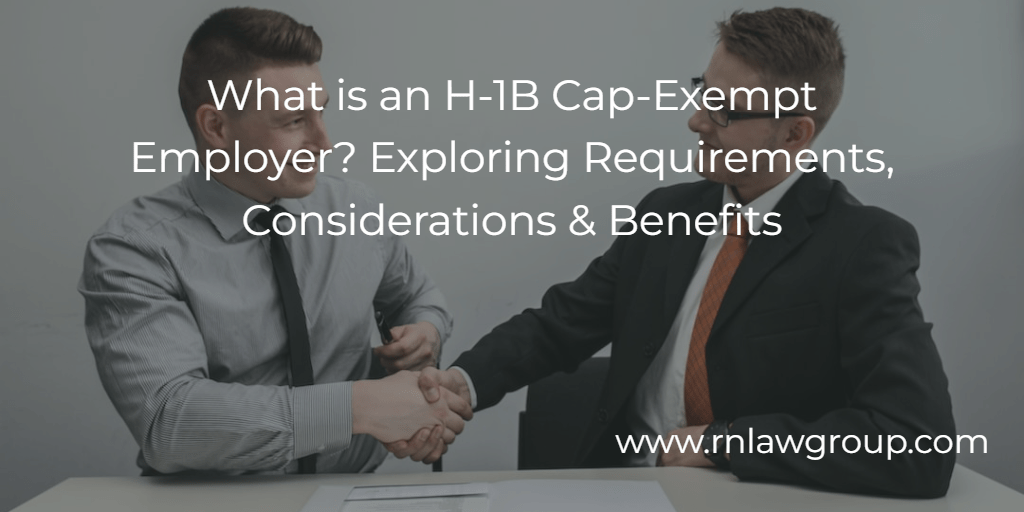
What is an H-1B Cap-Exempt Employer? Exploring Requirements, Considerations & Benefits
In the realm of U.S. employment-based immigration in the United States, the H-1B visa stands out as one of the most popular options for skilled foreign workers to work temporarily in the U.S. However, navigating the complexities of the H-1B visa process can be daunting, particularly due to the annual numerical quota system, which limits the availability of H-1B visas. Specifically, there are 65,000 visas available under the “regular cap” and an additional 20,000 under the advanced degree exemption. Due to high demand, a lottery system is used to select H-1B registrants, allowing only those selected to proceed with filing an H-1B petition.
Fortunately, certain employers qualify as cap-exempt, offering a pathway for foreign workers to secure an H-1B visa without being subject to the quota. This means that a cap-exempt employer can file an H-1B petition on behalf of a foreign worker at any time of the year and the foreign worker can begin work as soon as the H-1B petition is approved. In this article, we’ll examine H-1B cap-exempt employers, the requirements for eligibility, and the benefits they offer to both employers and employees.
Requirements for H-1B Cap-Exempt Employers
H-1B cap-exempt employers include:
- Institutions of higher education: An institution of higher education is an educational institution in any State that meets the following conditions:
- Is a public or other nonprofit institution;
- Admits as regular students only those having a certificate of graduation from a school providing secondary education, or the recognized equivalent of such a certificate;
- Is legally authorized within such State to provide a program of education beyond secondary education;
- Provides an educational program for which the institution awards a bachelor’s degree or provides not less than a 2-year program that is acceptable for full credit toward such a degree; and
- Is accredited by a nationally recognized accrediting agency or association.
- Non-profit entities related or affiliated with institutions of higher education: A nonprofit entity is considered “related to or affiliated with” an institution of higher learning if any of the following conditions are met:
-
- The two entities have shared ownership or control “by the same board or federation”;
- The nonprofit is operated by the higher education institution;
- The nonprofit is “attached to” a higher education institution as a “member, branch, cooperative, or subsidiary”; or
- The nonprofit has “entered into a formal written affiliation agreement” with the higher education institution that “establishes an active working relationship between” the two entities “for the purposes of research or education, and a fundamental activity of the nonprofit entity is to directly contribute to the research or education mission of the institution of higher education.” (e.g. Veterans Affairs hospital that would be considered affiliated with a medical school based on a contract or agreement for the training or education of health personnel).
- Non-profit research organizations: A nonprofit research organization is an organization that is mainly engaged in basic research and/or applied research.
- Government research organizations: A governmental research organization “is a federal, state, or local entity whose primary mission is the performance or promotion of basic research and/or applied research.” Basic and applied research for such organizations have the same definitions as for nonprofit entities, above.
Although an H-1B worker is considered exempt if employed directly by a qualifying entity, it is important to note that an employee does not necessarily need to work directly for a cap-exempt entity to be exempt from the cap. The exemption extends to certain situations where the petitioner is not one of the four types of entities eligible for exemption, but the employee will spend the majority of his or her work time performing job duties at a qualifying entity and those job duties directly and predominately further the essential purpose, mission, objectives or functions of the qualifying institution, organization or entity, namely, either higher education, nonprofit research or government research. Put simply, the petitioner must demonstrate a connection between the duties carried out by the H-1B worker and the objectives or operations of the qualifying entity.
Benefits and Considerations:
- Exemption from H-1B Cap: The most significant benefit of being a cap-exempt employer is the ability to sponsor H-1B visas without being subject to the annual cap. This means qualified foreign workers can secure H-1B visas through qualifying employers year-round, regardless of whether the annual cap has been reached.
- Flexibility in Hiring: Cap-exempt employers have the flexibility to hire foreign workers for specialized roles without being constrained by the limitations imposed by the H-1B cap. This enables them to attract top talent from around the world, filling crucial positions that may be difficult to fill domestically.
- Opportunities for Career Advancement: Working for a cap-exempt employer, particularly in the academic or research sector can open up unique opportunities for career advancement and professional development. Employees may have access to cutting-edge research projects, collaboration opportunities, and resources for furthering their education and skills.
- Cap-Subject Employment Ends: Foreign workers must keep in mind that if the cap-exempt employment ends, they will be subject to the cap unless subsequently employed by another cap-exempt employer or unless they were previously counted against the H-1B cap in the past six years.
- Concurrent Employment with a Cap-Subject Employer: Concurrent H-1B employment allows H-1B visa holders to work for multiple employers at the same time. Further, foreign workers working for a cap-exempt employer can seek concurrent H-1B employment with a cap-subject employer, even if they were never counted against the cap. However, it is important to note that if employment with the cap-exempt employer ends, the H-1B worker will not be able to continue to work for the H-1B cap-subject employer without obtaining an approved H-1B petition through the normal H-1B lottery process.
H-1B cap-exempt employers play a crucial role in facilitating the entry of skilled foreign workers into the U.S. By exempting these employers from the numerical limitations imposed by the H-1B cap, the U.S. immigration system encourages innovation, academic excellence, and collaboration on a global scale. For foreign workers seeking employment opportunities in the U.S., exploring opportunities with cap-exempt employers can provide a viable pathway to realizing career goals while contributing to the advancement of knowledge and technology. By conducting thorough research, networking effectively, and staying informed, foreign workers can increase their chances of securing a cap-exempt job with a qualifying entity. While the process may require dedication and perseverance, the opportunities available through cap-exempt employers can pave the way for a rewarding and fulfilling career in a chosen field.
If you are an H-1B employer or foreign worker and have questions about cap-exempt employment, our team at Reddy Neumann Brown PC can help! Schedule a consultation with any of Reddy Neumann Brown PC’s qualified business immigration attorneys at Appointments.
Krystal Alanis is a Partner at Reddy Neumann Brown PC with over 10 years of experience practicing U.S. business immigration law. Krystal manages the firm’s PERM Labor Certification Department, where she oversees all EB-2 and EB-3 employment-based green card matters. Krystal guides clients from a variety of industries through the maze of the PERM Labor certification process and has handled thousands of PERM applications throughout her career. Krystal guides employers through the I-140 and Adjustment of Status process, and assists clients with temporary work visas. Further, she oversees the firm’s I-9 compliance team where she advises employers regarding Form I-9 Employment Eligibility Verification requirements and conducts internal audits of a company’s I-9 records, processes, and procedures. Additionally, Krystal represents clients in Form I-9 U.S. Immigration and Customs Enforcement (ICE) inspections (Notice of Inspection). Krystal successfully settled a claim with ICE over Form I-9 substantive paperwork violations that led to an 88% reduction in civil fines for her client.

